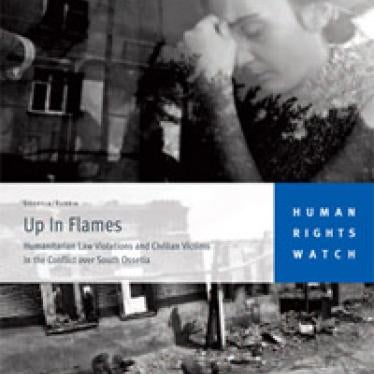(Moscow) - The de facto authorities of South Ossetia, a breakaway region of Georgia, should promptly investigate the vicious attack on a civic activist and hold those responsible to account, Human Rights Watch said today.
Timur Tskhovrebov, editor of The XXI Seculare independent newspaper and founder of the Iron Republican Party in South Ossetia, was attacked by approximately 10 individuals, allegedly including three members of the South Ossetian parliament, on July 24, 2010. The assailants reportedly threatened to kill Tskhovrebov because he had signed a joint appeal with Georgian activists urging those involved in the United Nations-sponsored Geneva consultations, a negotiations platform established after the August 2008 war, to make the humanitarian needs of the local population, including their security and freedom of movement, a priority. Tskhovrebov was hospitalized with multiple injuries.
"We are appalled by the attack on Tskhovrebov and deeply concerned about the safety of activists in South Ossetia," said Holly Cartner, Europe and Central Asia director at Human Rights Watch. "A prompt, thorough, and impartial investigation is needed to bring the assailants to justice."
Tskhovrebov told Human Rights Watch that a group of men cornered him at about 1 p.m. on July 24 on Isak Kharebov Street in central Tskhinvali, the capital of South Ossetia. Tskhovrebov recognized three of the men as members of parliament and staunch supporters of South Ossetia's president. According to Tskhovrebov, one of them had threatened him on the phone just the day before.
The men tried to force him into a car to "have a conversation." When he refused, they called him "a traitor" for having signed the joint statement with Georgian activists. The assailants then started beating Tskhovrebov, he said, and pushed him into the street, where he was hit by a passing car. Tskhovrebov reported that several policemen watched the men beating him but did not intervene.
Although he was severely hurt and bleeding, Tskhovrebov started to run away from his attackers. At that point, one of the members of parliament allegedly took out a gun and threatened to kill him on the spot. But Tskhovrebov managed to jump over the fence of the nearby compound of the International Committee of the Red Cross. He was later taken from its office to a hospital, where he was diagnosed with a concussion and a fractured arm, and wounds on his face and neck that required stitches. The doctors also suspected he had internal injuries. On July 25, Tskhovrebov was transferred to a hospital in Vladikavkaz, North Ossetia, where he remains.
The statement Tskhovrebov signed grew out of a meeting of a Georgian-Ossetian civil society forum in the Netherlands in July. The joint statement, adopted by the forum's 22 participants on July 16, urged the parties to the Geneva talks to focus on a number of urgent humanitarian and human rights issues facing the local population, such as access to health care, the problem of arbitrary detentions, and to work toward "a prompt agreement on basic mechanisms for cooperation on humanitarian issues."
The de facto authorities of South Ossetia condemned the statement. On July 20, Boris Chochiev, the South Ossetian presidential envoy and a participant in the Geneva consultations, called a news conference to criticize the initiative. Later that day, Chochiev spoke on the official TV channel calling Ossetian activists who had signed the document, and Tskhovrebov in particular, "traitors." He condemned them for damaging the South Ossetian position in the Geneva talks and undermining the authorities' efforts to achieve international recognition of the republic's status and its role in the war.
"Given the accusation that local parliament members took part in the beating and that the police stood by watching, there are strong grounds for suspecting official complicity in the attack on Tskhovrebov," Cartner said. "A blatant attack on an activist in broad daylight, compounded by the threats he received, clearly needs immediate and thorough investigation."
Whenever there are credible grounds for suspecting official involvement or acquiescence in acts of ill-treatment, the authorities have a clear legal obligation to make sure that an effective investigation is conducted that is capable of establishing the extent of any such involvement and bringing those responsible to account, Human Rights Watch said. Human rights law prohibits the use of immunity to protect officials from accountability for acts of ill-treatment.
After war broke out in August 2008, Tskhovrebov helped numerous journalists and international human rights groups working in the region, including Human Rights Watch and Russia Justice Initiative, a prominent international organization representing victims of human rights abuses at the European Court on Human Rights.
Human Rights Watch called on Russia and the international community to press the de facto authorities in South Ossetia to bring those responsible for the attack to justice and to foster a normal working climate for civil and political activists in the region.







